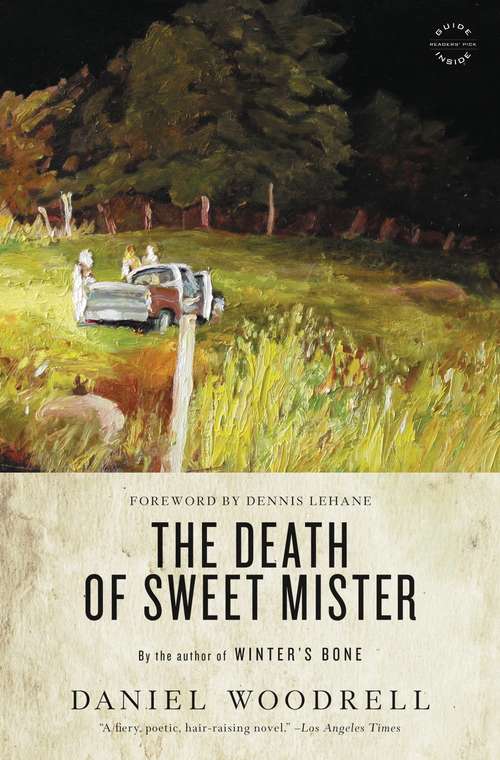The Death of Sweet Mister
By: and
- Synopsis
- Shug Akins is a lonely, overweight thirteen-year-old boy. His mother, Glenda, is the one person who loves him--she calls him Sweet Mister and attempts to boost his confidence and give him hope for his future. Shuggie's purported father, Red, is a brutal man with a short fuse who mocks and despises the boy. Into this small-town Ozarks mix comes Jimmy Vin Pearce, with his shiny green T-bird and his smart city clothes. When he and Glenda begin a torrid affair, a series of violent events is inevitably set in motion. The outcome will break your heart. "This is Daniel Woodrell's third book set in the Ozarks and, like the other two, Give Us a Kiss and Tomato Red, it peels back the layers from lives already made bare by poverty and petty crime." --Otto Penzler, "Penzler Pick, 2001"
- Copyright:
- 2001
Book Details
- Book Quality:
- Publisher Quality
- ISBN-13:
- 9780316206150
- Related ISBNs:
- 9780316206143
- Publisher:
- Little, Brown and Company
- Date of Addition:
- 04/24/12
- Copyrighted By:
- Daniel Woodrell
- Adult content:
- No
- Language:
- English
- Has Image Descriptions:
- No
- Categories:
- Literature and Fiction
- Submitted By:
- Bookshare Staff
- Usage Restrictions:
- This is a copyrighted book.
Reviews
4 out of 5
By Kyle Massey on May 9, 2012
Here's another happy little bedtime story from Daniel Woodrell! This one isn't as darkly comic as Tomato Red or the Bayou Trilogy, but not as grim as Winter's Bone. Morris "Shug" Akins narrates his tale of woe. His father hates him (and isn't actually his father, we eventually learn); his mother loves him, but still does wrong by him in her own way. Red is abusive and brutish, referring to the overweight Shug only as "fat boy" or "tub," enlisting him in his petty criminal adventures, which include stealing pills from cancer patients, which Red then sells to his nurse girlfriend. Meanwhile, Shug's mom, Glenda (whom he usually refers to as Glenda and not Mom) is the tragic figure: beautiful, alcoholic, one of those people whose ship has sailed off without them, due to circumstance and her own poor choices. Glenda is lonely, hating Red and having no other interaction with other men (or women, for that matter). So, in some ways, she seems to use her thirteen-year-old son as sort of a surrogate husband: dressing in a way Shug describes as "none too motherly," taking him to a movie and treating him as her date. It's clear that she loves Shug, doting on him, telling him how different he is from other men, wanting the best for him, trying to instill confidence in him. Shug is lonely too, painfully so: it's summertime, and we only see him in the company of one or the other of his parents or other family members. He appears to have no friends. And maybe that's why, as he creeps into adolescence, he begins to have some unhealthy ideas about Glenda, lending the story some creepy Oedipal undercurrents. But after a disastrous episode with Red, Glenda takes up with the new guy in town, a wandering chef working at a local restaurant. Shug's jealousy bubbles under the surface, but Red is the real problem ... until he isn't anymore, if you know what I mean. But like Tomato Red, the main theme here is loneliness, the fear of being alone, and as Glenda plans a getaway that doesn't include Shug, it is that fear that prompts Shug's finally desperate act just as it does Sammy Barlach's in Tomato Red. No happy ending, but a story you won't easily forget.
